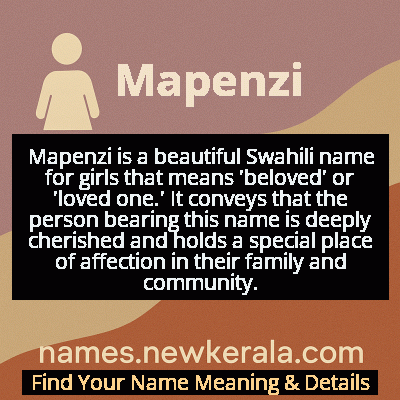Mapenzi Name Meaning & Details
Origin, Popularity, Numerology Analysis & Name Meaning of Mapenzi
Discover the origin, meaning, and cultural significance of the name MAPENZI. Delve into its historical roots and explore the lasting impact it has had on communities and traditions.
Name
Mapenzi
Gender
Female
Origin
African
Lucky Number
3
Meaning of the Name - Mapenzi
Mapenzi is a beautiful Swahili name for girls that means 'beloved' or 'loved one.' It conveys that the person bearing this name is deeply cherished and holds a special place of affection in their family and community.
Mapenzi - Complete Numerology Analysis
Your Numerology Number
Based on Pythagorean Numerology System
Ruling Planet
Jupiter
Positive Nature
Optimistic, inspirational, and creative.
Negative Traits
Scattered, exaggerating.
Lucky Colours
Yellow, gold, purple.
Lucky Days
Thursday.
Lucky Stones
Yellow sapphire.
Harmony Numbers
1, 2, 9.
Best Suited Professions
Arts, writing, communication.
What People Like About You
Creativity, optimism.
Famous People Named Mapenzi
Mapenzi Chibulo
Activist and Community Leader
Founded women's empowerment organizations in East Africa focusing on education and economic independence
Mapenzi Mwinyi
Educator and Author
Pioneered Swahili language education programs and authored children's books promoting African cultural values
Mapenzi Kamau
Musician and Cultural Ambassador
Popularized traditional Swahili music globally while incorporating modern elements
Mapenzi Odhiambo
Healthcare Advocate
Led maternal health initiatives in rural Kenyan communities, significantly reducing infant mortality rates
Name Variations & International Equivalents
Click on blue names to explore their detailed meanings. Gray names with will be available soon.
Cultural & Historical Significance
The name also reflects the historical Swahili civilization's blend of Bantu, Arabic, and Persian influences, where concepts of romantic and familial love were celebrated in poetry, music, and daily life. During the colonial era, names like Mapenzi served as cultural anchors, preserving indigenous values and linguistic heritage. In contemporary times, the name continues to symbolize resistance against cultural erosion while embracing modern African identity. It represents the enduring importance of emotional connections and interpersonal relationships in societies where community welfare often takes precedence over individualism.
Extended Personality Analysis
Women named Mapenzi are often perceived as embodying the loving essence of their name's meaning. They typically exhibit warm, nurturing personalities with strong emotional intelligence and empathy. Mapenzi individuals tend to be natural peacemakers who prioritize harmony in relationships and possess an innate ability to understand and comfort others. Their compassionate nature makes them excellent listeners and trusted confidantes, often serving as the emotional center of their families and social circles.
Beyond their gentle exterior, many Mapenzi women demonstrate remarkable resilience and inner strength. They approach challenges with a balanced perspective and maintain optimism even in difficult circumstances. Their loving nature doesn't equate to weakness; rather, it provides them with emotional fortitude and the ability to persevere through adversity. They often excel in caregiving professions, education, counseling, and community leadership roles where their natural empathy and interpersonal skills can flourish. The combination of emotional depth and practical wisdom makes Mapenzi individuals valued members of any community they belong to.
Modern Usage & Popularity
In contemporary times, Mapenzi maintains steady popularity across East Africa while gaining recognition in global African diaspora communities. The name has seen a resurgence among parents seeking meaningful African names that celebrate cultural heritage without being overly traditional. Urban professionals particularly favor Mapenzi for its elegant sound and positive connotations. While not among the most common names, it holds a special place as a choice that balances cultural authenticity with modern appeal. Social media and global connectivity have increased its visibility beyond traditional Swahili-speaking regions, with the name appearing in international contexts while retaining its cultural specificity. Recent years show a slight upward trend in usage as African naming traditions experience renewed interest and pride.
Symbolic & Spiritual Meanings
Symbolically, Mapenzi represents more than just romantic love—it encompasses universal love, compassion, and the interconnectedness of human relationships. The name symbolizes the idea that love is not merely an emotion but a fundamental force that binds communities and sustains social harmony. In metaphorical terms, Mapenzi embodies the concept of being a vessel of love, someone who both receives and radiates affection, care, and emotional support. It represents the African philosophical concept of Ubuntu—'I am because we are'—emphasizing that individual identity is shaped by loving relationships with others. The name also carries connotations of emotional healing, reconciliation, and the transformative power of love to overcome adversity and build stronger communities.

